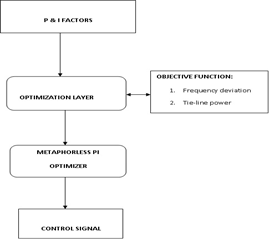Adaptive Power System Load Frequency Control based on Metaphorless Optimizers
International Journal of Emerging Trends in Science and Technology,
,
4 January 2024
https://doi.org/10.18535/ijetst/v2024.06
Abstract
This research proposes an alternative Load Flow Controller (LFC) to power systems stability studies based on the population-oriented mathematical optimizer called the PI-Rao. This approach is applied to stabilizing frequency deviations in single-area power systems and compared with a basic PI controller. The research employed a dynamic systems model for a singular area system to capture the dynamics of an LFC. The system is composed of two parts: Part 1 is the LFC optimization systems part which makes a global search for the optimal P & I factors based on some prespecified frequency fluctuation. In contrast, Part 2 is the METARPHOLESS-PI part which uses a population-oriented mathematical logic. The presented optimization in (Part 1) follows classical methods inspired by evolutionary approaches to search for the optimal set of fitting parameters. The minimization of area control error (ACE) is considered an objective function involving the minimization of an Integral Time multiplied Absolute Error (ITAE). The results of simulations have shown the superiority of the proposed solution considering the loading changes of 0.02p.u to 0.1p.u and at intervals of 0.02p.u. Thus, the PI-Rao should serve as another potential solution for power systems LFC applications. The current challenges and future research directions for the existing and prospective projects of the power system operators seek microprocessor-based fault analysis solutions.

How to Cite
Download Citation
References
- Article Viewed: 172 Total Download




